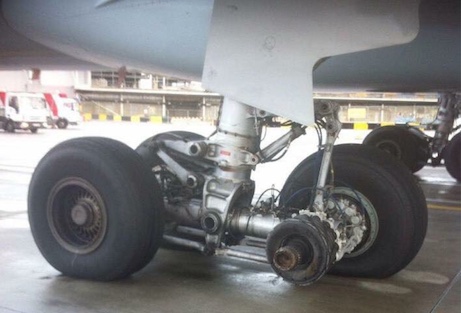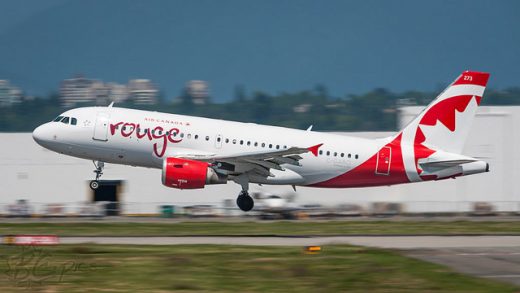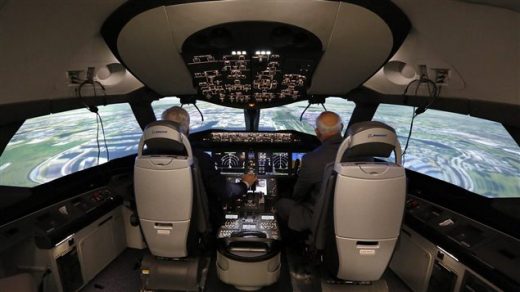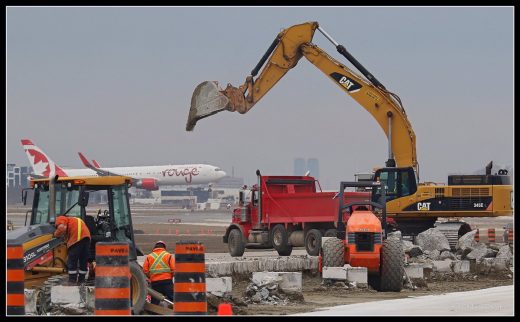 Scroll Down to see all of this week’s updates
Scroll Down to see all of this week’s updates
A330 Loses Wheel

Ground crews at London’s Heathrow Airport were surprised to find an Air Canada A330 missing one of four wheels on its right main gear when it landed there on Monday.
The aircraft took off from Montreal seven hours earlier and left the wheel in Montreal beside a runway. It apparently rolled away while the aircraft was taxiing for takeoff.
No one noticed anything amiss in the takeoff roll or landing and Air Canada said the mishap, attributed to bearing failure, never endangered the flight, despite breathless mainstream media accounts that suggested something serious had happened.
“As the landing gear is comprised of eight wheels in addition the two nose wheels, this had no impact on the safe operation of the flight,” spokeswoman Isabelle Arthur told the CBC.
Rouge Pilot Collapes On Final

An Air Canada Rouge lost consciousness as the aircraft approached Pearson International Airport on April 3.
The flight was enroute from Fort Lauderdale-Hollywood International Airport and set up for the runway when the pilot flying collapsed.
The pilot monitoring (PM) took immediate control and landed the aircraft without further incident,” said the CADORS report. “The pilot regained consciousness at some point during short final or after touchdown. The pilot sought medical attention immediately after the conclusion of the flight.”
The airline downplayed the incident despite the rarity of pilot incapacitation, especially in critical phases of flight.
“While this situation is certainly not something we experience often, all crew members are trained and qualified to manage a flight to landing under a single pilot operation – if needed,” Air Canada spokesman Peter Fitzpatrick told CTV News.
TC Defends Simulator Training

Transport Canada’s director general Aaron McCrorie defended cuts to training flights for its inspectors in Parliament on Tuesday saying they’re actually better off learning on the ground.
“You can actually get better training with a simulator,” he said in testimony before the House of Commons Transport Committee.
McCrorie was responding to questions from committe members about a survey conducted by the union representing TC inspector pilots that said 80 percent of its members though safety was being compromised by moving training from the cockpit to the simulator.
The change in training focus came with sharp budget cuts to the inspector flight training budget and the pilots are now able to be fully checked out without ever leaving the ground.
McCrorie told the committee that there are “better, more efficient pilots coming out of the simulator stream.”
He was backed up by Denis Guindon, director general for aviation safety oversight and transformation said simulators can replicate situations that are too dangerous to try in flight and modern sims replicate “everything down to the last two feet.”
TC has cut its training budget from $8 million to $3.5 million and financial constraints are thought to be the real reason TC inspectors hardly ever fly anymore. The Canadian Federal Pilots Association says its survey found two thirds of TC inspector pilots haven’t flown a plane in the last year.
TC spokeswoman Natasha Gauthier told the National Observer last week that the department has “revised its flying program” using “the latest simulator technology” and said it’s in line with international standards.
Pearson Delays Ripple

Reconstruction of a main runway at Canada’s busiest airport has caused rippling cancellations, particularly among regional airlines.
Runway 05/23 will be out of service until the end of May and that has caused some slot problems.
Most cancellations have affected regional airlines and London International Airport has had 10 Toronto flights cancelled in the last couple of weeks.
“There have been cancellations and we are concerned,” said Mike Seabrook, the airport’s chief executive told the London Free Press.
“They (Air Canada) are between a rock and a hard place. Pearson has to do airport maintenance. They are not going to cancel flights from Heathrow or Beijing.”
The closure also affects business and general aviation traffic. Slots are required for all such traffic and no arrival slots will be issued from 3 p.m. to 7:59 p.m.
